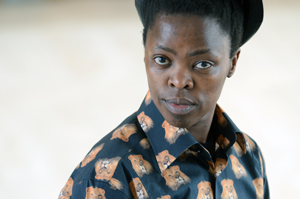“We relied on outsiders to document our histories.” – Zanele Muholi delivers Women’s Day Lecture
 Zanele Muholi
Photo: Stephen Collett |
“Our society is decaying because of hate crimes against LGBTI groups. You can’t say it does not affect you, because each of us is at least connected to one person [of LGBTI orientation].”
These words by Zanele Muholi, photographer and visual activist of LGBTI rights, who delivered the Women’s Day Lecture. The event commemorated Women’s Day and took place on Thursday 7 August 2014 at the Bloemfontein Campus. The lecture was hosted by the Centre for Africa Studies, as part of their Gender Studies Programme.
Muholi screened photographs featuring lesbian couples and recounted their all-too-real life stories. Her work emphasises the importance of queering the normative gaze by representing black lesbians in ‘straight’ portraits in a collection of works titled ‘Faces and Phases’. By focusing on lesbians in her work, Muholi shows that women in same sex relationships are just women, with the same dreams and aspirations as their heterosexual sisters.
But lesbian women carry an additional, grave fear – that of corrective rape. Muholi speaks on this topic in the video, ‘We live in fear’, which she screened during her talk. The documentary features the lives of lesbian women in Kwa Thema township in Johannesburg. Shockwaves spread through this settlement in 2008 after the brutal killing of a lesbian woman and the ensuing series of hate crimes against the LGBTI community.
Zanele describes her work as “documenting our own stories. For years we relied on outsiders to document our histories. We should do it ourselves.”